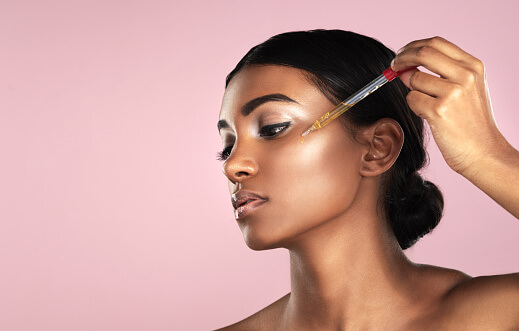Serums are a type of skincare product that is lightweight and concentrated. They contain a high dose of active ingredients that can be used to address a variety of skin concerns. Serums are typically applied after cleansing and before moisturizer, and they can be used in conjunction with other skincare products.

What are the benefits of using serum?
There are many benefits to using serum, including:
- Deep penetration: Serums are formulated with small molecules that can penetrate deep into the skin, delivering nutrients and active ingredients where they are needed most.
- High concentration of active ingredients: Serums typically contain a higher concentration of active ingredients than other skincare products, such as cleansers and moisturizers. This means that they can be more effective at addressing specific skin concerns.
- Targeted delivery: Serums can be targeted to address specific skin concerns. For example, there are serums that are specifically designed to hydrate the skin, reduce wrinkles, or fade dark spots.
- Customization: Serums can be customized to meet your individual skin needs. You can layer different serums to address multiple skin concerns, or you can choose a serum that is specifically designed for your skin type.
Table of Contents
Different types of serums
There are many different types of serums available, each with its own unique benefits. Here are some of the most common types of serums:
- Hydrating serums: Hydrating serums are designed to increase the skin’s hydration levels. They typically contain ingredients such as hyaluronic acid, glycerin, and ceramides. Hydrating serums are ideal for all skin types, but they are especially beneficial for people with dry or dehydrated skin.
- Anti-aging serums: Anti-aging serums are designed to reduce the appearance of wrinkles and fine lines. They typically contain ingredients such as retinol, vitamin C, and niacinamide. Anti-aging serums are ideal for people who are concerned about the signs of aging.
- Brightening serums: Brightening serums are designed to even out the skin tone and fade dark spots. They typically contain ingredients such as vitamin C, kojic acid, and arbutin. Brightening serums are ideal for people with hyperpigmentation or uneven skin tone.
- Acne-fighting serums: Acne-fighting serums are designed to treat and prevent breakouts. They typically contain ingredients such as salicylic acid, benzoyl peroxide, and azelaic acid. Acne-fighting serums are ideal for people with acne-prone skin.
- Exfoliating serums: Exfoliating serums are designed to remove dead skin cells and reveal brighter, more radiant skin. They typically contain alpha hydroxy acids (AHAs) or beta hydroxy acids (BHAs). Exfoliating serums are ideal for people with dull or uneven skin texture.
- Repairing serums: Repairing serums are designed to strengthen the skin barrier and reduce inflammation. They typically contain ingredients such as panthenol, centella asiatica, and niacinamide. Repairing serums are ideal for people with sensitive skin or skin conditions such as eczema and psoriasis.

How to choose the right serum for your skin type and concerns?
When choosing a serum, it is important to select one that is appropriate for your skin type and concerns. Here are a few tips:
- Dry skin: If you have dry skin, look for a serum that is hydrating and contains ingredients such as hyaluronic acid, glycerin, or ceramides.
- Oily skin: If you have oily skin, look for a serum that is non-comedogenic and contains ingredients such as niacinamide, salicylic acid, or glycolic acid.
- Sensitive skin: If you have sensitive skin, look for a serum that is fragrance-free and hypoallergenic. Avoid serums that contain harsh chemicals or alcohol.
- Aging skin: If you are concerned about the signs of aging, look for a serum that contains retinol, vitamin C, or niacinamide.
- Specific skin concerns: If you have specific skin concerns, such as hyperpigmentation, acne, or eczema, look for a serum that is specifically designed to address those concerns.
How to apply serum?
To apply serum, follow these steps:
- Cleanse your face and neck.
- Pat your skin dry with a clean towel.
- Apply a small amount of serum to your fingertips.
- Gently massage the serum into your face and neck.
- Allow the serum to absorb completely before applying moisturizer.
Tips for using serum
Here are a few tips for using serum:
- Start with a small amount of serum and gradually increase the amount as your skin tolerates it.
- Apply serum twice daily,
Final Words:
Serums are a great way to boost your skincare routine and address specific skin concerns. They are lightweight, concentrated, and contain a high dose of active ingredients that can penetrate deep into the skin. Serums are available in a variety of formulas to target different skin concerns, such as hydration, aging, hyperpigmentation, acne, and eczema.
When choosing a serum, it is important to select one that is appropriate for your skin type and concerns. You can also layer different serums to address multiple skin concerns.
To apply serum, cleanse your face and neck, pat your skin dry, and apply a small amount of serum to your fingertips. Gently massage the serum into your face and neck, and allow it to absorb completely before applying moisturizer.
Serums are a safe and effective way to improve your skin health. With consistent use, you can see visible results in the appearance and texture of your skin.
